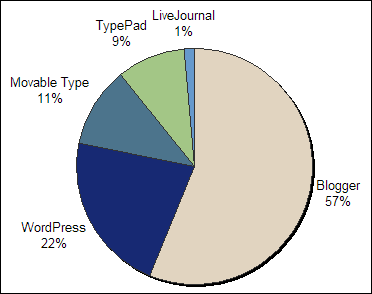The Oregon weblogs site I run (
ORblogs) is watching a tiny slice of the blogosphere. The site is currently tracking 1,051 active weblogs, and that number is made up of weblogs by people who choose to
participate at the site. (And there are currently 48.3 million weblogs, according to
Technorati.) ORblogs tracks a bunch of metadata from these 1,000+ participating blogs, with most of the data exposed in various ways across the site. However there are a few bits of data that you
don't see on the site, and I think it's interesting to run some numbers and share them once in a while.
One bit of data collected from RSS feeds is the
generator. If you look at the source XML of most RSS or Atom feeds, you'll often see a
generator or
admin:generatorAgent tag. And because weblog authors usually don't touch their feed templates—if they have access to their feed design at all—this tag is a fairly good way to see which weblog tool was used to generate any given weblog.
Without further explanation, here's weblog tool usage across Oregon weblogs flowing through ORblogs:
- Blogger: 431
- WordPress: 167
- Movable Type: 87
- TypePad: 72
- LiveJournal: 11
And to show off my Excel charting skills, here's a pie graph of this data:

But wait! That doesn't add up to 1,051. True, of the total active weblogs, 70 don't have a feed associated with their listing. (Typically because their weblog HTML is missing an auto-discovery tag, or the tag contains a bad URL.) And of the rest that do have a feed associated with their listing, 173 feeds didn't have a generator listed. The rest were generators that numbered four or fewer such as
Microsoft Spaces, and
PMachine.
"What about
FeedBurner?", you cry. ORblogs is tracking that usage too, and luckily FeedBurner passes the original
generator information through in its feeds. Of these blogs, 55 were using FeedBurner.
Another interesting bit of data typically stored in these generator tags is a version number for the software. Here's how some of the version numbers break down (when a version number was available):
Blogger (who knew they had versions?):
- Blogger 6.72: 344
- Blogger 5.15: 76
WordPress:
- WordPress 2.0.3: 33
- WordPress 2.0.2: 28
- WordPress 1.5.2: 22
- WordPress 2.0.1: 18
- WordPress 1.5.1.3: 11
- WordPress 2: 9
- WordPress 1.5: 8
- WordPress MU: 7
Movable Type:
- Movable Type 3.2: 52
- Movable Type 3.121: 5
- Movable Type 3.17: 5
- Movable Type 2.63: 4
- Movable Type 2.64: 4
- Movable Type 2.661: 4
- Movable Type 3.15: 4
TypePad had a few different version numbers (1.0 and 1.5.1), but most often simply listed 'TypePad' or 'http://www.typepad.com/' as the generator. LiveJournal was LiveJournal, no version.
And that's what's happening with a slice of the Oregon blogosphere as of July 14th, 2006.
Update: And for fun, here's a similar survey I ran using the HTML
generator tag in 2004 back when ORblogs was tracking just 309 weblogs:
ORblogs Forum: Weblog Tool Survey. Blogger and Movable Type were tied back then.
